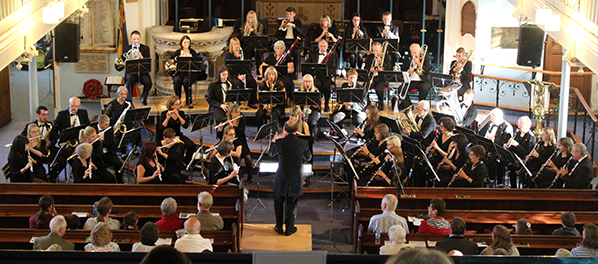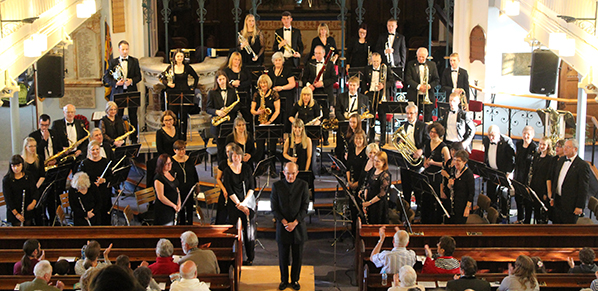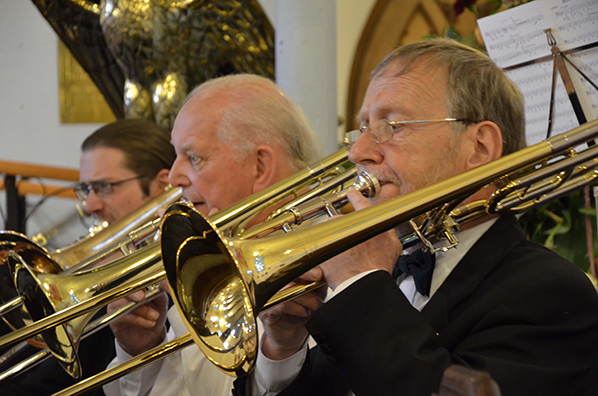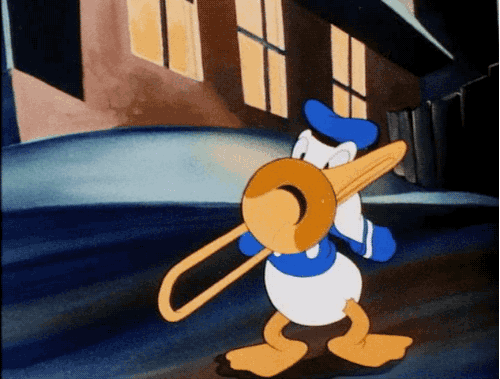|
|
| Notes from the Director of Music |
|
The first concert of our band year is almost upon us and as you might expect rehearsals are well advanced. The annual Poppy Appeal concert is a firm favourite in the band calendar not just because we are able to play our part in helping to raise funds for the Royal British Legion Poppy Appeal but because we also get to perform a concert with our longstanding friends from the Seaforth Highlanders Pipe and Drum Band under the direction of Pipe Major Steve Bozon.
|
|
The Seaforth Highlanders is a pipe and drum band where each of the pipers play what is called the Great Highland Bagpipe (GHB). Although the GHB is now considered to be Scotlands national instrument, the Bagpipe or in Gaelic "piob-mhor" (the great pipe) is not an instrument which has its origins in Scotland. The bagpipe is an instrument of great antiquity, an instrument which has its origins in the Middle East and traveled through and evolved in Europe alongside early civilisation.
Playing with a pipe band represents quite a challenge for the concert band. Concert band instruments are able to play in any major or minor key, and they are even able to move between keys (modulate) within a piece. Instruments like the flute, the clarinet, the trumpet or the trombone are all tuned to a system based on equal intervals between all notes in a scale, a system we call equal temperament. Because all the instruments are tuned to the same system they can all play together in 'perfect harmony'.
However that is not the case with the bagpipe. Instead of the thirteen half-notes in the equal temperament scale the GHB has eight notes, some of which coincide with notes in the equal temperament scale and some which do not! Therein lies the challenge. The problem is made more complicated because a pipe player learns that the lowest note he can play on the pipes is "low A" and this note is notated as such on bagpipe music. However, this 'low A' is in fact most closely tuned to concert pitch Bb, so from the point of view of the arranger not only is the bagpipe not playing in the same key it is not even playing the same notes!
Now we all know that a challenge is another word for an opportunity and challenges are there to be overcome to provide, in this instance, opportunities for concert bands and pipe bands to play together. At our joint concert on the 10th November we will have the opportunity to play a number of pieces together including Cathcart, Killaloe, Amazing Grace, Sleeping Tune and of course Highland Cathedral.
Along with a number of first time performances by the concert band this promises to be an exceptional concert of music in support of the 2017 RBL Poppy Appeal.
|

|

Ashby Concert Band - Leicestershire & Rutland Wildlife Trust Concert 2017
|

|
|
As usual we will round the year out with our annual Christmas Concert. We will be playing a number of new pieces this year as well as many of the established favourites. Without doubt a night not to be missed!
The detail of our concerts for 2018 is still at the planning stage, however, we do know that on the 17th March we will be performing a concert in support of Ashby School students who are planning a trip to Nepal to help with ongoing reconstruction work following the devastating earthquake which occurred there in 2015. The music for the concert will be a collection of well known and much loved "Superhero" film themes, including the likes of Superman, Batman, Ant Man and Guardians of the Galaxy.
In June we will be performing a concert of music for Ashby Rotary but the date and theme are still to be confirmed; as soon as we have the details they will be posted on our website.
|

|

ACB LRWT Concert - May 2017
|

|
Portrait of a Player : Sarah Anderton
|
|
Our featured player in this issue of Notations is one of the 1st flute players in the band, Sarah Anderton. Sarah joined the band almost 10 years ago and is now one of the members of the band Committee, in fact she is the band Treasurer.
|
|
Sarah took up the flute when she was eight years old having served the necessary apprenticeship on the recorder at school in Lancashire. Due to a liking for folk music Sarah quite fancied learning to play the guitar but that was not to be. Instead she was inspired by the great Sir James Galway, OBE - "living legend of the flute" according to www.jamesgalway.com - to focus her musical ambitions on the flute. James Galway lived in Belfast, just across the Irish Sea from Sarah in Lancashire, so it would seem that his influence reached out on the wind and set Sarah off on a life of flute playing. Sarah recalls having an LP of "The Man With The Golden Flute", aka James Galway, playing his "Greatest Hits" (which must have included John Denver's "Annie's Song" which reached No. 3 in the UK Singles Chart in 1987), although she swears she did not have a life sized poster of him hanging on her bedroom wall.
|
|
|
Sarah no longer has the LP but she still has the cool, retro record player which has now been commandeered by her eldest son Joshua, who until very recently was also a member of the band. As well as concert band music Sarah also enjoys choral music having been a member of a chamber choir before she moved to live in Ashby.
When Sarah is not making music with the band she enjoys being involved in renovating their house and in seeking solace gardening and looking after her eleven chickens, not that there is much solace to be gained cleaning up after chickens. Sarah also enjoys spinning wool using her forty year old spinning wheel. Sarah is also a keen and experienced fell walker and has climbed most of the major peaks in the English Lake District, where the family regularly take their annual holiday.
Arguably Sarah's greatest contribution to the band however is not her flute playing but the fact that she provides a caring and loving home for Elmer, our band mascot. Sarah pours love and devotion onto Elmer and even makes him clothes, including Christmas jumpers and concert dress. Elmer is quite the best dressed bear in town thanks to Sarah's skills at the spinning wheel and sewing machine.
|
|
|

|
|
|
The trombone - What's It All About?
|
|
This is the second in the series of "What's It All About" articles in Notations. In the last edition we covered 'Conducting' - this time we are going to look at that most unique of instruments, the trombone. The trombone is a 15th-century development of the trumpet and until around 1700 was known as the sackbut.
|
|
The trombone is the only instrument with a slide which is used to change the note and tuning. In theory, a good trombone player should be able to maintain perfect pitch forever, adjusting the position of the slide very slightly as well as flexing their embouchure. The trombone has been scientifically proven to be the loudest wind instrument, capable of overplaying, individually, 3 trumpets, 7 tubas, 40 clarinets, 4 horn players, and sometimes (depending on the players) the entirety of the orchestra.
The trombone was the first brass instrument able to play a chromatic scale. The trombone has the same range as the Euphonium, or Baritone, and when played in a brass band is a transposing instrument in the key of B flat, however, in a concert band or orchestra the trombone plays in concert pitch. There are several 'flavours' of trombone such as the soprano, alto, tenor (the normal trombone), and the wonderful bass trombone.
|
|
|
In his 'Treatise on Orchestration', Hector Berlioz famously wrote: "In my opinion the trombone is the true head of that family of wind instruments that I have named the epic one. It possesses nobility and grandeur to the highest degree; it has all the serious and powerful tones of sublime musical poetry, from religious calm and imposing accents to savage outbursts. Directed by the will of a master the trombone can chant like a choir of priests, it can threaten, it can utter gloomy sighs or a mournful lament or a bright hymn of glory. Trombones can break forth into awe-inspiring cries and awaken the dead or doom the living with their fearful voices."
The trombone is a brass instrument found within the low brass section of the band. The trombone, when held in playing position, extends forward from the mouthpiece, then curves back around at just past the length of the musician's arm, then returns, passing the player's head, and curves once more, passing the head again, and opens up into the bell of the instrument.
The trombone has seven positions, cleverly named 1st-7th position! Each of these said positions extends from 1st, where the slide is completely retracted, moving out at specific intervals, although the intervals may change slightly to accept slight variations in pitches, until it reaches the seventh position and the player's arm is fully extended, exposing the 'sox' of the slide.
|

Members of ACB trombone section.
|
|
As to players themselves, many say they enjoy the playing of the instrument because, firstly, it is, again, the loudest instrument, excepting percussion, etc., secondly, it has an interesting sound, unlike that of trumpets or woodwinds, and lastly, because it is simply fun to wave the slide around and pretend you are shooting a Nerf gun at the conductor.
Famous trombone players include Homer Simpson - alias Homer Simpson, Peter Griffin - alias Peter Griffin from 'The Family Guy', Commander Will Riker (Starship Enterprise) - alias Jonathan Frakes, and of course the unforgettable Glenn Miller, Tommy Dorsey and Jack Teagarden, who in truth were probably the main inspiration for many trombone players of the day. Top of the classical trombone players list are musicians like Jospeh Alessi (Principal Trombone with the New York Philharmonic since 1985), Denis Wick (Principal Trombone with the London Symphony Orchestra and considered to be one of the finest orchestral trombone players of all time) and Christian Lindberg (one of the master exponents of the trombone who has worked tirelessly to bring the perception of the trombone as a solo instrument to a wider public).
There is a downside to playing the trombone and that is trombone players are probably at the top of the list for jokes about them and their instruments. One of the kindest is "What is the definition of playing in harmony? - Four trombone players playing in unison". The really unkind ones are not suitable for inclusion in this article.
Jokes aside we should be in no doubt about the fact that the trombone is a very versatile and unique instrument which is at the very core of the brass section in any music ensemble. There are few great orchestral works, whether classical or film score, which do not use the trombone to great effect. Almost without exception the great film scores of John Williams use the trombone to provide power and presence to the music.
Ashby Concert Band is fortunate indeed to have three trombone players, Dave (1st trombone), Ron (2nd trombone) and Jotham (3rd/bass trombone) and long may they continue to provide that valuable brass foundation for the band.
|

|

Follow my lead!
|
 |
| 2017/2018 Dates for your Diary |
16th December 2017
'Christmas Concert' - Holy Trinity Church - Ashby - 4.30 p.m.
Featuring the best Christmas favourites. |
17th March 2018
'Nepal Reconstruction Concert' - Holy Trinity Church - Ashby - 7.30 p.m.
Music for Superheros. |
June 2018
'ACB Rotary Concert' - Holy Trinity Church - Ashby - 7.30 p.m.
A fund-raising concert on behalf of the Ashby Rotary 2018 Charity Appeal. |
|

|
Supporters Acknowledgements |
| Ashby Concert Band is especially grateful for the continued support of our Patrons: |
Mr & Mrs M Worth
Mr & Mrs K Spencer
Mrs M Ross
Margaret Ferguson
Joan Hardwick
Kay Stephens
Paul Hillman
|
Mr H K Berry MBE & Mrs C Berry
Mr & Mrs J Backhouse
Mr Derek & Mrs Teresa Hayes
Mr & Mrs Sowter
Mr A Holland
Alan Tricker
Mr & Mrs N Price
|
and for the assistance given to the band by Johnson, Murkett & Hurst, Accountants of Ashby de la Zouch. |
|
|

|

|
Ashby Concert Band
Registered Charity no. 1112173
|
|
|